|
|
|
Sort Order |
|
|
|
Items / Page
|
|
|
|
|
|
|
| Srl | Item |
| 1 |
ID:
130237
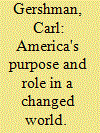

|
|
|
|
|
| Publication |
2014.
|
| Summary/Abstract |
Public opinion reports on Americans' attitudes toward foreign policy sketch a picture of retrenchment, war-weariness, and skepticism toward global engagement, even as there is also a growing concern that the world is increasingly unstable and dangerous. Nothing about this picture is new or controversial. Some may worry about it more than others, but it is now commonly accepted that the US is downsizing its international role, and that the administration, the Congress, and the general public are more absorbed with domestic concerns than with foreign challenges or threats.
|
|
|
|
|
|
|
|
|
|
|
|
|
|
|
|
| 2 |
ID:
130238
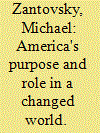

|
|
|
|
|
| Publication |
2014.
|
| Summary/Abstract |
It is not a new observation that, just as the twentieth century started late, with the shots in Sarajevo, so did the twenty-first century, with the September 11th attacks. Compared to the conflagration that followed the first event, whose centennial this year is a welcome opportunity for some belated soul-searching, the bloodshed that started with the second event has been limited, but its consequences may have been just as profound. The two American administrations that inherited the post-September 11th world have since struggled, along with the rest of the world, with the consequences. One chose to confront the evil head-on, in order to eradicate its sources and deter its repetition, with mixed results. The other largely opted for seeing and hearing little evil, with results that the jury is still out considering.
|
|
|
|
|
|
|
|
|
|
|
|
|
|
|
|
| 3 |
ID:
130239
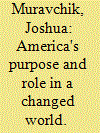

|
|
|
|
|
| Publication |
2014.
|
| Summary/Abstract |
Almost every war that America has fought since the beginning of the twentieth century was a war America had determined to avoid. We were neutral in World War I?.?.?.?until unlimited submarine warfare against our trans-Atlantic shipping became intolerable. We resisted entering World War II until Pearl Harbor. We defined the Korean peninsula as lying outside our "defense perimeter," as our secretary of state declared in 1950, a few months before North Korea attacked South Korea and we leapt into the fray. A few years later, we rebuffed French appeals for support in Vietnam in order to avoid involving ourselves in that distant country which was soon to become the venue of our longest war and greatest defeat. In 1990, our ambassador to Iraq explained to Saddam Hussein that Washington had "no opinion on?.?.?.?your border disagreement with Kuwait," which he took as encouragement to swallow his small neighbor, forcing a half million Americans to travel around the world to force him to disgorge it. A year after that, our secretary of state quipped about the violent disintegration of Yugoslavia that "we have no dog in that fight," a sentiment echoed by his successor, of the opposite party, who, demonstrating his virtuosity at geography, observed that that country was "a long way from home" in a place where we lacked "vital interests"-all this not long before we sent our air force to bomb Serbia into ceasing its attacks on Bosnia and then bombed it again a few years later until it coughed up Kosovo.
|
|
|
|
|
|
|
|
|
|
|
|
|
|
|
|
| 4 |
ID:
130240
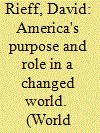

|
|
|
|
|
| Publication |
2014.
|
| Summary/Abstract |
Let me begin by putting my own moral and ideological cards on the table, since I assume that I have been asked to participate in this symposium because of, and not in spite of, the fact that I reject the idea that America's global hegemony is not just good for the United States but assures global peace and stability as well, and thus is good for the world. In his recent book-length article for a special issue of the New Left Review titled "American Foreign Policy and Its Thinkers," a brilliant, implacable anatomization of the American Empire, Perry Anderson approvingly quotes Christopher Layne's observation that "in international relations, benevolent hegemons are like unicorns-there is no such animal." That is certainly my view. And I would add that a democratic empire (for other than its own citizens, at least) is quite simply a contradiction in terms.
|
|
|
|
|
|
|
|
|
|
|
|
|
|
|
|
| 5 |
ID:
130241
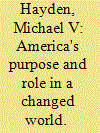

|
|
|
|
|
| Publication |
2014.
|
| Summary/Abstract |
I had never been a big fan of American exceptionalism. It was too self-referential, self-identifying, self-focused for my personal comfort. Then one bitterly cold day in February 1994, I was wandering through the open-air market in Sarajevo. The market had been hit by a single mortar round the previous weekend and sixty-eight people had been killed. Holes made by fragments from the 120-mm shell were still visible in the asphalt.
As I stared at the gouged surface in my battle dress and parka, Sarajevans began to come up to me, point to the small American flag on my upper sleeve, give a hesitant thumbs-up gesture, and whisper, almost prayerfully, "USA, USA."
Edward Snowden's leaks have fixated the media and the public on privacy and espionage, but the larger and more complex debate on protecting American security in the 21st century has been wanting.
At that point it became clear to me that it mattered less whether I thought America was exceptional. What mattered was that many people around the world thought that we were, and expected us to act accordingly. In many ways this is less something we have earned or even want, and more the product of historical circumstance. But a burden has clearly been ours, and when it is no longer ours the best judgment we can hope for is something along the lines of "As global hegemons go, these guys weren't bad." Now, under President Obama, the United States is involved in a redefinition or at least a recalibration of that exceptional role.
|
|
|
|
|
|
|
|
|
|
|
|
|
|
|
|
| 6 |
ID:
130242
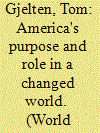

|
|
|
|
|
| Publication |
2014.
|
| Summary/Abstract |
The presidencies of George W. Bush and Barack Obama suggest what doesn't work in efforts to promote US influence in the world. By ordering an ill-conceived invasion of Iraq, Bush alienated US allies. His policies of secretly imprisoning Islamist militants and then subjecting them to "enhanced" interrogation and indefinite detention at Guantánamo struck Muslims everywhere as evidence of a war on Islam. Barack Obama, elected as the most explicitly anti-war president since Woodrow Wilson, came into office determined to undo the international damage done by his predecessor. "The walls between old allies on either side of the Atlantic cannot stand," Obama said in Berlin in 2008, and a year later, speaking in Cairo, he promised "a new beginning" with the Muslim world, with relations "based upon mutual interest and mutual respect." As promised, he withdrew US combat troops from Iraq. By 2013, however, Obama had fared little better than Bush in his global outreach. According to the Pew Research Center, support for the United States in Egypt, Jordan, Lebanon, and Pakistan was actually lower than it had been in the last year of the Bush administration. In Europe, the US favorability rating was higher than it was under Bush, but it had fallen steadily in the years since Obama took office, and it remained far below where it stood in 2000. One possible lesson from these years is that presidential personalities, speeches on foreign stages, and the changing international opinions of US policies matter less than we might think. Perhaps the most reliable measure of America's standing in the world is how appealing the country is to all those who are considering migration. Since 2007, Gallup surveys in more than one hundred and fifty countries have shown that the United States is far and away the number one favored destination. The most recent survey projected that one hundred and thirty-eight million people worldwide would like to move permanently to the United States, more than three times the number who would choose the United Kingdom, the second most favored destination. Those numbers show the United States still represents opportunity and promise to people around the world, and it is clearly in the US global interest to maintain that reputation.
|
|
|
|
|
|
|
|
|
|
|
|
|
|
|
|
| 7 |
ID:
130243
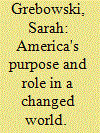

|
|
|
|
|
| Publication |
2014.
|
| Summary/Abstract |
I'll never forget my brief and ill-received show of American patriotism as a young expatriate in Beirut. It was the summer of 2010, and the city was teeming with convoys of Lebanese youth honking and waving flags to celebrate their favorite teams' victories in the World Cup. After an exciting win by the US, I joined a group of Americans in a street celebration. But cruising down the main thoroughfare of West Beirut, our procession of stars and stripes was met with disapproving looks. The image that remains with me to this day is that of an older man standing silently with his shoe in his hand. The tattered sole was pointed directly at us, an expression of disrespect in Muslim culture. We recognized the gesture's meaning only because a similar shoe had been thrown at the American president's head a year earlier.
Today's generation of young Americans, known as the millennials, has come of age at a time when America has been humbled on the world stage. Many of them have traveled extensively at a young age and experienced this diminished reputation firsthand. Their parents and grandparents believe that America has been a remarkable force for good in the world and that the country should not lose sight of its responsibility to shape events globally because of mistakes made in the last decade. But millennials seem more fixed on the limits of American power and disenchanted with ideas of American exceptionalism.
Because of these reservations, the millennial generation is often described as declinist or isolationist. I disagree. Young Americans care more than any other age group about what happens beyond our borders. Millennials tend toward multilateralism and the cautious use of force, and perhaps would be more selective in committing US resources overseas. But far from an abdication of global leadership, this prudence may prove to be the silver lining to millennials' crisis of confidence in America's role as, in President Obama's words, "not just a place on a map, but the light to the world."
|
|
|
|
|
|
|
|
|
|
|
|
|
|
|
|
| 8 |
ID:
130244
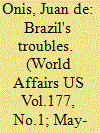

|
|
|
|
|
| Publication |
2014.
|
| Summary/Abstract |
With the extravaganza of the winter Olympic Games in Sochi over, the spotlight now turns to Brazil, the host of the FIFA World Cup championship in June. This tournament, the most widely viewed of global sports spectacles, is held every four years and involves thirty-two national teams, each of which has survived two years of regional competitions in Europe, Africa, Asia, and the Americas to reach the final play-offs. Starting on June 12th, sixty-four games will be played in four weeks, in stadiums all over Brazil, until the winner emerges in a final match on July 13th at the Maracanã, Rio de Janeiro's world-famous arena. Three million foreign fans are expected to visit Brazil, and billions of television viewers worldwide will watch the games. When the World Cup was awarded to Brazil in 2007-part of a remarkable parlay that included the award of the 2016 Summer Olympics to Rio as well-the country's economy was starting to boom as part of the BRIC upsurge that seemed ready to shake up international finance. The event was political from the onset, its significance potentially going well beyond the results on the playing fields where Brazil has won the world championship a record five times, a source of great national pride. But despite initial euphoria over being chosen to host the World Cup, Brazil is now experiencing doubts over whether it can pull off the event and second thoughts about the upsurge of influence on the international scene it was supposed to symbolize. The fervid devotion of Brazilians to soccer has made this country the Land of Football (as well as samba and Carnaval). Some non-Brazilian sports commentators have been baffled, therefore, by protest signs saying, "No to the Cup." But Brazil today is not just a land of football, it is also a land of public protests against corruption, heavy taxes, and deplorable public education and health services, cities with chaotic urban transport, markets with inflated consumer prices, and a dysfunctional political system that is manipulated by an elite for personal benefit.
|
|
|
|
|
|
|
|
|
|
|
|
|
|
|
|
| 9 |
ID:
130252


|
|
|
|
|
| Publication |
2014.
|
| Summary/Abstract |
Few world leaders in recent years have been subject to the level of derision faced by President François Hollande of France. Even before a Paris tabloid exposed his late-night dalliances with actress Julie Gayet-sending Hollande's then-companion and France's now former first lady Valérie Trierweiler to hospitalization for severe depression, and making the improbable Lothario the primary target of comedians on both sides of the Atlantic-Hollande was the most unpopular president in the history of France. Since then, things have gotten worse.
An inelegant man who never served as government minister, a leader lacking the physical presence and political stature of his predecessors, Hollande is an accidental president who came to power as the most palatable replacement for the man who was to be the Socialist Party's standard bearer in 2012: the brilliant former finance minister and IMF president Dominique Strauss-Kahn. Strauss-Kahn abruptly quit politics after being arrested, though the charges were later dismissed, in connection with the rape of a chambermaid at the Sofitel hotel in New York in May 2011. Hollande, in fact, campaigned as an Everyman, a candidate with middle-class tastes (he prided himself on not even owning a car) who would be a "normal president"-the antithesis of incumbent Nicolas Sarkozy, whose term as president was partly overshadowed by the drama of his own personal life and numerous friendships with the ultra-wealthy.
|
|
|
|
|
|
|
|
|
|
|
|
|
|
|
|
| 10 |
ID:
130236
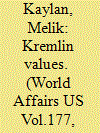

|
|
|
|
|
| Publication |
2014.
|
| Summary/Abstract |
After Forbes magazine named Vladimir Putin the most powerful man in the world, a status he has surely consolidated by overseeing the Winter Olympics and the invasion of Crimea, one heard a great deal of media talk about the Russian leader's wily skills in playing the global geostrategic "game." What one didn't hear, what one virtually never hears, even from highly experienced Western commentators on Russian affairs, is anything about Putin acting according to principles or pursuing actions according to a coherent ideology. Not surprising, you might say, since the man obviously has no such concerns-other than a will to win, for himself and his seat of power; no vision comparable to that of the Kremlin in the old Soviet Union, which furnished it and its allies with a huge asset and a troublesome headache in the form of an armory of fully rationalized ideas that legitimized a predictable approach to international relations and even provided the regime with a perverse "morality."
|
|
|
|
|
|
|
|
|
|
|
|
|
|
|
|
| 11 |
ID:
130251
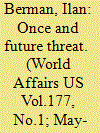

|
|
|
|
|
| Publication |
2014.
|
| Summary/Abstract |
Is al-Qaeda really on the run? Since the death of Osama Bin Laden, the Obama administration has actively promoted the narrative that it has gained the upper hand in its struggle with the world's most dangerous terrorist group. The president himself, as well as a variety of other US officials, have insisted time and again that al-Qaeda is "decimated" and on a "path to defeat." But reports of the terror group's death, to borrow a phrase from Mark Twain, have been greatly exaggerated. Although it suffered considerable operational setbacks over the past decade, al-Qaeda has proven both adaptive and resilient. Today, its two principal offshoots pose growing challenges to stability in North Africa and the southern Persian Gulf. The changing organization now sees growth opportunities in the deepening civil war in Syria, growing disorder in post-Saddam Hussein Iraq, lawlessness in the Sinai Peninsula, and the impending US withdrawal from Afghanistan. In all of these hot spots it is looking to expand its franchises and threaten US interests. Moreover, as a result of America's progressive disengagement from the Middle East and North Africa, al-Qaeda is poised to discover still greater room for maneuver in the years ahead.
The most important fact about al-Qaeda is that it is an evolving organization, far different from the one that carried out the attacks of September 11, 2001. The years since then have seen its forces significantly eroded in Afghanistan, where coalition operations succeeded in whittling away at the core group of militants that made up what can be called al-Qaeda "central." In the summer of 2010, then CIA Director Leon Panetta estimated there were just fifty to one hundred al-Qaeda fighters in the group's country of origin. A similar number was reported to be operating in Afghanistan by a coalition general last year.
|
|
|
|
|
|
|
|
|
|
|
|
|
|
|
|
| 12 |
ID:
130247


|
|
|
|
|
| Publication |
2014.
|
| Summary/Abstract |
A year ago or so, standing before his Justice and Development Party (AKP) Congress, Turkish Prime Minister Recep Tayyip Erdogan proclaimed great goals for Turkey and himself, pointing toward 2023, the hundredth anniversary of the Turkish Republic, as a potential golden moment. Among his plans was a constitutional change giving the presidency enhanced powers equal to and perhaps exceeding even those of modern Turkey's founding father, Kemal Ataturk. It was obvious to his audience that Erdogan planned to run for this more powerful office in the presidential elections scheduled for this coming summer and that his prospective victory would consolidate his role as the "new founder" of the Turkish Republic. But now, on the eve of what might have once seemed less important mayoral and local elections, this imperial dream has evaporated. Erdogan admits he faces a "test," but in fact, his risk is more serious-not just his status as a uniquely charismatic leader of a crucially important country, but perhaps even his continued control of his own party.
|
|
|
|
|
|
|
|
|
|
|
|
|
|
|
|
| 13 |
ID:
130250
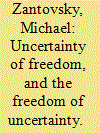

|
|
|
|
|
| Publication |
2014.
|
| Summary/Abstract |
It likely has occurred to everyone at least once that it would be a wonderful thing to win the lottery. And many of us have indeed bought a lottery ticket at least once in our lives, only to validate the well-known fact that the chances of winning in a lottery are rather small. Some of us, though, may have not put up with this sober conclusion and proceeded on the assumption that if we bought two tickets our chances of winning the lottery would increase twofold, and then perhaps extrapolated the logic to three, five, or even ten tickets. And a few of us might have even entertained the theoretical possibility that if we bought all the tickets we would be assured of winning the lottery. There is nothing wrong with dreaming of a stroke of luck and trying to maximize one's chances. But it also pays to use common sense and elementary knowledge of the probability calculus. Buying all the lottery tickets will not only give you an absolute certainty of winning but also an absolute certainty of losing vast amounts of money in the process.
But what, one may ask, does buying a lottery ticket have to do with freedom? Freedom, after all, is arguably not an outcome of a random process like winning in a lottery. It is a conscious choice to believe that men are born with certain inalienable rights and should be thus free to make decisions about their lives. Based on this belief, we build the institutions of a free society, provide them with the necessary checks and balances, and guarantee the rule of law to prevent arbitrary punishment and thwart attempts to hijack our freedom. For all the problems of a free society, we believe with Winston Churchill that democracy, the political system that embodies, maintains, and administers a free society, is vastly preferable to all the alternatives. Living in a democracy, we believe that we have hit the jackpot in the lottery of political systems.
|
|
|
|
|
|
|
|
|
|
|
|
|
|
|
|
|
|
|
|
|